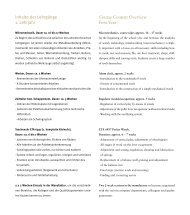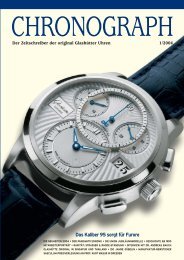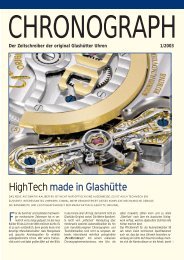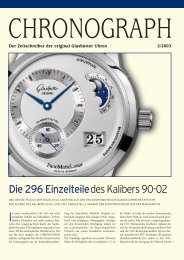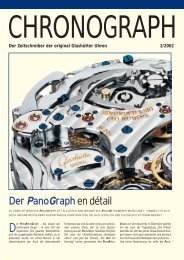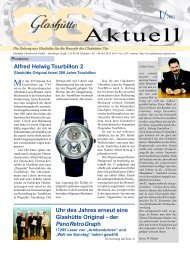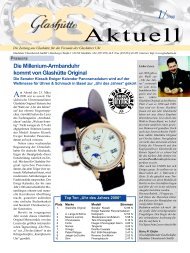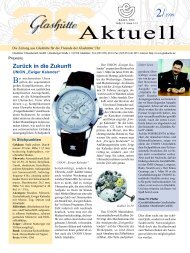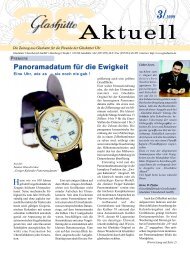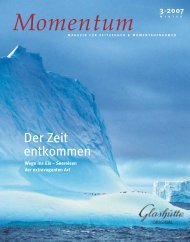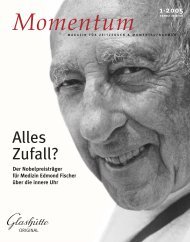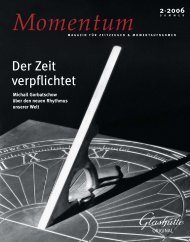2009 Momentum - Glashütte Original
2009 Momentum - Glashütte Original
2009 Momentum - Glashütte Original
You also want an ePaper? Increase the reach of your titles
YUMPU automatically turns print PDFs into web optimized ePapers that Google loves.
FB y Maike Zürcher<br />
ive hours in just ten seconds, a whole day in twelve<br />
minutes, a century in the blink of an eye... Some times<br />
when we dream we feel that we have lived through<br />
a whole lifetime, but when we wake up a glance at<br />
the clock reveals that just a few minutes have passed.<br />
French physician Alfred Maury, who was researching dreams<br />
before Sigmund Freud became famous, had personal experience<br />
of this sensation: while asleep in 1861 he dreamt himself into the<br />
turmoil of the French Revolution. He was to be executed, but just<br />
as the blade of the guillotine was plunging towards his exposed<br />
neck, he awoke to discover that a piece of his bed had fallen onto<br />
the back of his head. Maury concluded that at the moment of<br />
impact his brain must have formulated an appropriate story to<br />
explain the physical sensation, and thus created the French Revo -<br />
lution dream as a kind of flashback. So it would seem that we do<br />
not experience time in the same way in our sleeping and our<br />
waking lives – as Maury’s days of revolution must actually have<br />
taken place in just seconds. Since then, however, other scientists<br />
researching the phenomenon of dreaming have dismissed Maury’s<br />
theory as a subjective impression, submitting evidence that they<br />
say proves the contrary.<br />
Almost a century later, in 1951, researchers at the<br />
University of Chicago discovered REM sleep. During REM phases,<br />
when the sleeper’s eyes move rapidly, the brain is much more<br />
active than during deep sleep. This is the time when dreams occur.<br />
Although the brain is actually about as active as it is when the<br />
person is awake, the body remains still, the muscles do not move<br />
– thankfully, as this means we can move around in our dreams<br />
without bashing into all the bedroom furniture back in the real<br />
world. Scientists now distinguish between five different phases of<br />
sleep, which are repeated several times throughout the night.<br />
Shortly after the groundbreaking discovery of REM, two researchers<br />
at the University of Chicago, William Dement and Nathaniel<br />
Kleitman, attempted to prove that time as we dream it and time<br />
as we experience it when awake do correspond after all. Test subjects<br />
in their sleep laboratory were asked, upon being awakened<br />
from REM sleep, how long they thought they had been dreaming.<br />
Their answers were pretty much correct – if they had been<br />
REMing for 15 minutes, they usually felt their dream had lasted<br />
about that long.<br />
Yet research into dreams represents a particular<br />
challenge for scientists. What the data available to dream researchers,<br />
or oneirologists, lacks is immediacy. Michael Wiegand, psychiatry<br />
professor in Munich, explains: “When we remember a dream, the<br />
simple act of recalling it becomes a reconstruction. Our brain goes<br />
through the story of our dream in a very different way when it is<br />
awake – the conditions are utterly different to the moment at which<br />
we were actually having the dream. When we dream, our brains<br />
are in a third state between deep sleep and waking.” Women tend<br />
to remember their dreams better than men do – but this is probably<br />
for sociological reasons, as women are encouraged to pay more<br />
attention to their feelings and impressions.<br />
So oneriologists have to depend on what their test subjects tell<br />
them about their dreams once they have woken up – when they<br />
are on an entirely different plain of consciousness. And so far no<br />
one has come up with a nifty little device to record our dreams,<br />
so this group of scientists have nothing to work with but subjective<br />
impressions that cannot be measured. And anyone who has tried<br />
“Life is made up of two<br />
parts: the past – a dream;<br />
the future – a wish” Arab proverb<br />
<strong>Momentum</strong> 1· <strong>2009</strong><br />
41



